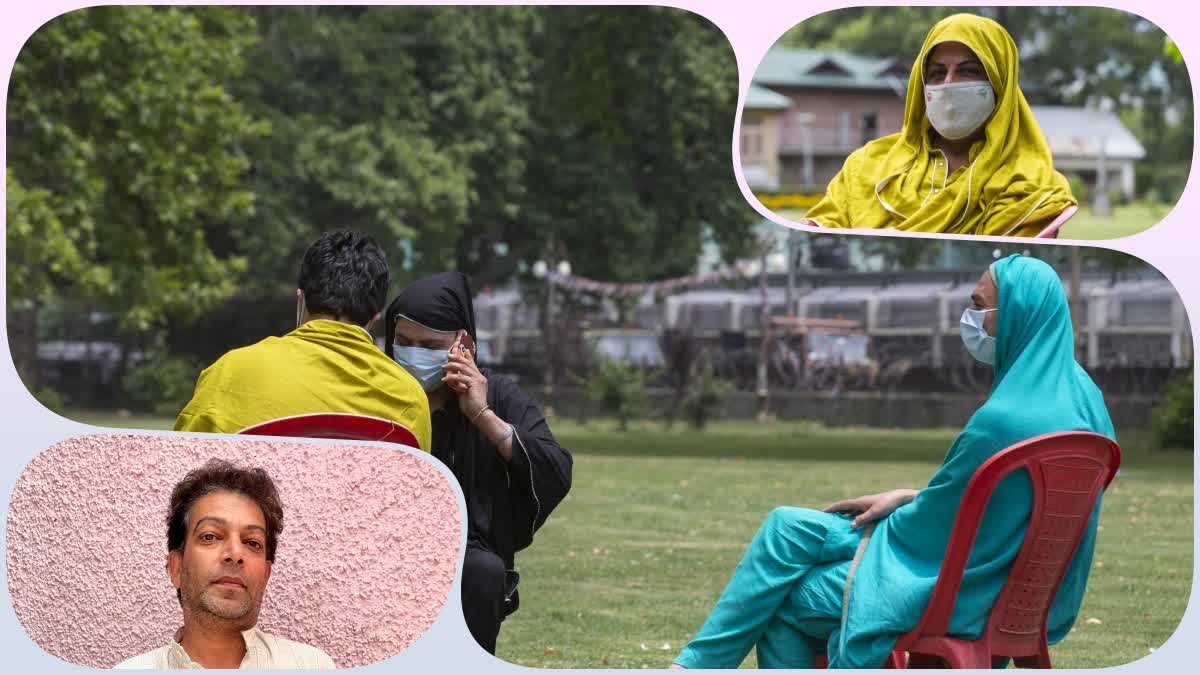Srinagar: It has been more than 40 years since ‘Rosy’ or 'Rose', as she is lovingly called by her counterparts, abandoned the school. But her memory of classmates who earned names and social status in later years has not faded away. She is also least interested in meeting them and often changes her way to escape their sight.
“It feels odd to be among them (classmates),” says Rosy. “I live and earn on my own. Why should I knock on anyone's door? I have held the hand of my God. Their presence revives my inner pain as they would pass lewd comments on my identity and body in school.”
Born as Gulzar Ahmad more than 50 years ago in a south Kashmir village, she relocated to Srinagar in the formative years and stayed in the company of her fellow transgenders. For a major part of her life, she has lived as a tenant in a single room in an old rickety house on the third floor in Srinagar’s congested Barbarshah neighbourhood. Until now, Rosy eked out her livelihood by the trust she has earned from many families for tying wedding knots successfully.
Over the years, the matchmaking replaced by matrimonial sites has dwindled her work. Besides, the rising inflation and expenses, including power bills, have made the modest earnings fall short and turned her to the monthly assistance of the Jammu and Kashmir government.
Now helpless, Rosy is going against her will and meeting one of her old acquaintances from the school to facilitate the paltry monthly stipend of Rs 1000, which has stopped beginning this year for want of some documents. “My documents are complete, but the pension has not been credited to my account so far,” she says while approaching the J&K Social Welfare Department responsible for implementing social schemes for different categories, especially those hailing from vulnerable sections. “I will ask the concerned official known to me to talk to their counterpart in my home district for any discrepancy and process my case quickly.”
Though the amount is too meagre in the face of mounting expenses, she feels it gives her a sense of security in the face of any eventuality. In the past, many trans people in Kashmir had to beg for sustenance in their old age or during the days of no work with the horrors of the COVID-19 pandemic-induced lockdown still afresh.
Unlike other parts of the country, the community comprising 4,137 people in Jammu and Kashmir, as per the last census in 2011, relies on matchmaking for their source of income. Besides, they also perform, like singing and dancing, at weddings, giving them a reason to sustain their lives. However, with matrimonial sites and social media forums pushing matchmaking online, their traditional livelihood means have dried up.
“There is no conducive environment for the community as violence, both sexual and physical and psychological, occurs to them in schools, leading to dropouts. It renders them ineligible for white-collar jobs,” says Aijaz Ahmad Bund, a Kashmiri activist working for the rights of LGBTQ. He has authored the first ethnographic study of the transgender community in the Valley, ‘Hijras of Kashmir: A Marginalised Form of Personhood’.
“There are limited options for livelihood for the community, like matchmaking and performances at weddings. It is a kind of reinforcement from society that you are meant for it,” he says. “But the work has shrunk due to a change in the institution of marriage. This forces many to sell their bodies, especially since there is an escalation in sex work in Kashmir post-Covid pandemic.”
But even worse, there’s a dark underbelly. The trans people identified by the derogatory term ‘laanch’ in the Muslim majority Valley face discrimination and stigma both in private and public, with many forced to leave their families at a young age.
Like, a 31-year-old Nuzhat experienced physical violence at the hands of her two brothers. The persistent beating and abuse prompted her to melt away from her community at the age of 12, living away from her home. “I had feminine traits from the beginning and wanted to do what women would do. I would relate to girls and feel comfortable in their company,” she recalls.
Initially, Nuzhat would feel claustrophobic at home and question her identity in the face of slurs and negativity from the people around her.
“I would silently weep during the night after starting to live as a tenant three kilometres away from my home,” sighs Nuzhat. With a wry smile, she says that peace and comfort trickled in the company of trans people.
